Fleurs du Mal Magazine


Or see the index

A Dream
I heard the dogs howl in the moonlight night;
I went to the window to see the sight;
All the Dead that ever I knew
Going one by one and two by two.
On they pass’d, and on they pass’d;
Townsfellows all, from first to last;
Born in the moonlight of the lane,
Quench’d in the heavy shadow again.
Schoolmates, marching as when they play’d
At soldiers once, but now more staid;
Those were the strangest sight to me
Who were drown’d, I knew, in the awful sea.
Straight and handsome folk, bent and weak, too;
Some that I loved, and gasp’d to speak to;
Some but a day in their churchyard bed;
Some that I had not known were dead.
A long, long crowd, where each seem’d lonely,
Yet of them all there was one, one only,
Raised a head or look’d my way;
She linger’d a moment, she might not stay.
How long since I saw that fair pale face!
Ah! Mother dear! might I only place
My head on thy breast, a moment to rest,
While thy hand on my tearful cheek were prest!
On, on, a moving bridge they made
Across the moon-stream, from shade to shade,
Young and old, women and men;
Many long-forgot, but remembered then,
And first there came a bitter laughter;
A sound of tears a moment after;
And then a music so lofty and gay,
That eve morning, day by day,
I strive to recall it if I may.
William Allingham
(1824 – 1889)
A Dream
• fleursdumal.nl magazine
More in: Allingham, William, Archive A-B, Archive A-B
Jim Harrison: Complete Poems is the definitive collection from one of America’s iconic writers.
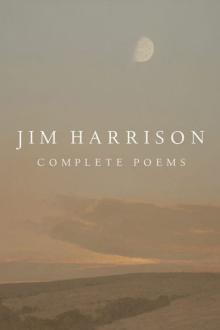 Introduced by activist and naturalist writer Terry Tempest Williams, this tour de force contains every poem Harrison published over his fifty-year career and displays his wide range of poetic styles and forms. Here are the nature-based lyrics of his early work, the high-velocity ghazals, a harrowing prose-poem “correspondence” with a Russian suicide, the riverine suites, fearless meditations inspired by the Zen monk Crazy Cloud, and a joyous conversation in haiku-like gems with friend and fellow poet Ted Kooser.
Introduced by activist and naturalist writer Terry Tempest Williams, this tour de force contains every poem Harrison published over his fifty-year career and displays his wide range of poetic styles and forms. Here are the nature-based lyrics of his early work, the high-velocity ghazals, a harrowing prose-poem “correspondence” with a Russian suicide, the riverine suites, fearless meditations inspired by the Zen monk Crazy Cloud, and a joyous conversation in haiku-like gems with friend and fellow poet Ted Kooser.
Weaving throughout these 1000 pages are Harrison’s legendary passions and appetites, his love songs and lamentations, and a clarion call to pay attention to the life you are actually living. The Complete Poems confirms that Jim Harrison is a talented storyteller with a penetrating eye for details, or as Publishers Weekly called him, “an untrammeled renegade genius… a poet talking to you instead of around himself, while doing absolutely brilliant and outrageous things with language.”
Jim Harrison (1937–2016) was the author of over three dozen books, including Legends of the Fall and Dalva, and served as the food columnist for the magazines Brick and Esquire.
He published fourteen volumes of poetry, the final being Dead Man’s Float (2016). His work has been translated into two dozen languages and produced as four feature-length films. As a young poet he co-edited Sumac magazine with fellow poet Dan Gerber, and earned fellowships from the National Endowment for the Arts and the Guggenheim Foundation.
In 2007, he was elected into the Academy of American Arts and Letters. Regarding his most beloved art form, he wrote: “Poetry, at its best, is the language your soul would speak if you could teach your soul to speak.” Jim Harrison certainly spoke the language.
#new poetry
Complete Poems
by Jim Harrison
Joseph Bednarik (Editor)
Terry Tempest Williams (Introduction)
Format: Hardcover
Publisher: Copper Canyon Press
December 7, 2021
Language: English
944 pages
ISBN-10: 155659593X
ISBN-13: 978-1556595936
$40.00 list price
• fleursdumal.nl magazine
More in: #Editors Choice Archiv, - Book News, - Bookstores, Archive G-H, Archive G-H
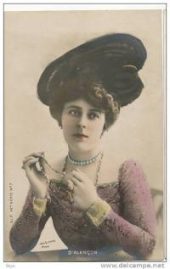
Requiescat in Pace
A Alec Carter
Mort au champ d’honneur (1914).
(Qu’il repose en paix !).
Où donc repose-t-il à présent, l’être cher ?
Dans le creux de quel arbre ou sous quelle colline ?
Quel oreiller soutient son beau visage clair ?
Sur quels draps argileux crispe-t-il ses mains fines ?
Autrefois, sur mon bras, il dormait tendre et fier ;
Je voyais son regard à travers ses paupières,
A-t-il pris, pour mourir, sa pose familière ?
Et ses yeux sans regards, peut-être, sont ouverts ?
Je n’ écarterai plus ses cheveux sur sa tête,
Je ne le verrai plus sourire en s’éveillant,
Je ne connaîtrai plus la délicate fête
De prendre, en un baiser, la gaîté de ses dents.
Que n’ai-je pu du moins, charmer sa dernière heure !
Eclairer la douleur et l’ombre du chemin ;
Pour qu’il sente qu’une âme est près de lui, qui pleure,
Que je borde son lit de mes tremblantes mains.
Mais non ! le lit est fait de feuilles et de terre,
C’est un lit à la fois, étroit, vaste et glacé…
Sans couronnes de fleurs, sans cierges mortuaires,
Je ne sais où – là-bas – est mort le bien-aimé !
Emilienne d’Alençon
(1869-1946)
Requiescat in pace
A Alec Carter Mort au champ d’honneur (1914).
(Qu’il repose en paix !).
• fleursdumal.nl magazine
More in: Archive A-B, Archive A-B, d'Alençon, Émilienne

Verboden Terrein
T.M.
Spannender dan boeken, een tuin,
was de verwilderde bongerd.
Nog onwetend dwalen in dat domein
van netels en varens, gonzende
dan weer doodstille poelen, van geritsel
in geplet gras, in overvolle loofkuilen,
onder de rok van dennen.
Dan, plots, spitste spel zich toe
op verandering van lijf en leden,
een hem en een haar, knoestend
op de dikste tak van de appelboom.
Glanzend gleed hij nader over de bast.
Jij ervoer eerste verraad, werd één
met de stam. Ik
viel.
Albert Hagenaars
Verboden Terrein
Gedichten
# new poetry
by Albert Hagenaars
Pelgrimsgrond
Gedichten
Uitgeverij In de Knipscheer
ISBN 978-94-93214-32-3
84 pagina’s
Prijs ca. € 17,50
Verschijnt begin 2022
• Albert Hagenaars (Bergen op Zoom, 1955) was aanvankelijk werkzaam als beeldend kunstenaar en galeriehouder. Hij studeerde Nederlands en bracht veel tijd in Frankrijk door. In 1980 koos hij voor de literatuur. Werk van zijn hand verscheen in talrijke bladen en bloemlezingen, waaronder Maatstaf, De Tweede Ronde, Literair Akkoord, Raster, Poëziekrant en ‘De Nederlandse poëzie van de negentiende en twintigste eeuw in 1000 en enige gedichten’. Behalve gedichten, romans en vertalingen schrijft hij ook kritieken over literatuur en moderne beeldende kunst voor tal van bladen. Hagenaars werkt vaak samen met kunstenaars en musici en ook met collega’s uit andere taalgebieden. Enkele van zijn boeken werden vertaald; in het Duits, Frans, Indonesisch en Roemeens. Enkele componisten maakten muziek bij werk van Albert Hagenaars. Hagenaars maakte veel reizen, door o.a. de Verenigde Staten, Latijns-Amerika en het Verre Oosten. De laatste jaren woont hij deels in Indonesië, het geboorteland van zijn vrouw, Siti Wahyuningsih, met wie hij al ruim 200 Nederlandstalige gedichten van bekende en onbekende auteurs in Bahasa Indonesia vertaalde en publiceerde. Begin 2022 verschijnt een nieuwe bundel: Pelgrimsgrond bij Uitgeverij In de Knipscheer (meer informatie op website: www.alberthagenaars.nl)
• fleursdumal.nl magazine
More in: - Book News, Archive G-H, Archive G-H, Hagenaars, Albert
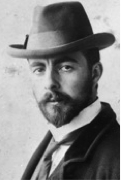
My Love
She has tender eyes that tell
All her prim, set lips suppress —
Daring thoughts that ever dwell
Prisoned in her bashfulness;
Hints of sudden tenderness
That within her breast rebel.
Till her bosom’s fall and swell
Tell her meaning all too well,
To her heart’s demure distress.
She has soft, smooth cheeks that flame
As she nestles close, so close,
With the new half-joy, half-shame,
That within her bosom glows,
And each fevered feature shows.
Her hot pulses beat acclaim
Of the hopes she dare not tame,
Fervid thoughts she cannot name —
Till I kiss her, and she knows.
She has clinging arms of white,
Little hands and fingers fine,
And she holds me tight, so tight;
While her eager arms entwine
Deep I drink her kisses’ wine.
Hush! I feel through all her slight,
Trembling figure love’s delight,
And she knows that all is right,
And her bosom beats with mine.
Arthur Adams
(1872-1936)
My Love
• fleursdumal.nl magazine
More in: Adams, Arthur, Archive A-B, Archive A-B
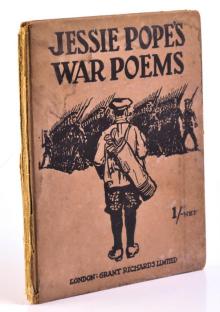
War Girls
There’s the girl who clips your ticket for the train,
And the girl who speeds the lift from floor to floor,
There’s the girl who does a milk-round in the rain,
And the girl who calls for orders at your door.
Strong, sensible, and fit,
They’re out to show their grit,
And tackle jobs with energy and knack.
No longer caged and penned up,
They’re going to keep their end up
Till the khaki soldier boys come marching back.
There’s the motor girl who drives a heavy van,
There’s the butcher girl who brings your joint of meat,
There’s the girl who cries ‘All fares, please!’ like a man,
And the girl who whistles taxis up the street.
Beneath each uniform
Beats a heart that’s soft and warm,
Though of canny mother-wit they show no lack;
But a solemn statement this is,
They’ve no time for love and kisses
Till the khaki soldier-boys come marching back.
Jessie Pope
(1868 – 1941)
War Girls
From: War Poems
• fleursdumal.nl magazine
More in: *War Poetry Archive, Archive O-P, Pope, Jessie, WAR & PEACE
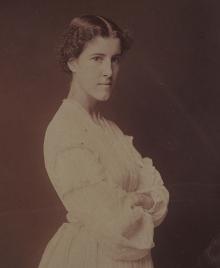
Girls of to-day
Girls of today! Give ear!
Never since time began
Has come to the race of man
A year, a day, an hour,
So full of promise and power
As the time that now is here!
Never in all the lands
Was there a power so great,
To move the wheels of state,
To lift up body and mind,
To waken the deaf and blind,
As the power that is in your hands!
Here at the gates of gold
You stand in the pride of youth,
Strong in courage and truth,
Stirred by a force kept back
Through centuries long and black,
Armed with a power threefold!
First: You are makers of men!
Then Be the things you preach!
Let your own greatness teach!
When Mothers like this you see
Men will be strong and free–
Then, and not till then!
Second: Since Adam fell,
Have you not heard it said
That men by women are led?
True is the saying–true!
See to it what you do!
See that you lead them well.
Third: You have work of your own!
Maid and mother and wife,
Look in the face of life!
There are duties you owe the race!
Outside your dwelling-place
There is work for you alone!
Maid and mother and wife,
See your own work be done!
Be worthy a noble son!
Help man in the upward way!
Truly, a girl today
Is the strongest thing in life!
Charlotte Perkins Gilman
(1860-1935)
Girls of to-day
Suffrage Songs and Verses
• fleursdumal.nl magazine
More in: # Classic Poetry Archive, Archive G-H, Archive G-H, Feminism
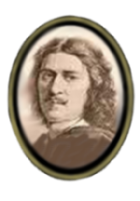
La pluie
Enfin la haute Providence
Qui gouverne à son gré le temps,
Travaillant à notre abondance
Rendra les laboureurs contents :
Sus ! que tout le monde s’enfuie,
Je vois de loin venir la pluie,
Le ciel est noir de bout en bout
Et ses influences bénignes
Vont tant verser d’eau sur les vignes
Que nous n’en boirons point du tout.
L’ardeur grillait toutes les herbes,
Et tel les voyait consumer
Qui n’eût pas cru tirer des gerbes
Assez de grain pour en semer.
Bref, la terre, en cette contrée,
D’une béante soif outrée,
N’avait souffert rien de pareil
Depuis qu’une audace trop vaine
Porta le beau fils de Climène
Sur le brillant char du soleil.
Mais les dieux mettant bas les armes
Que leur font prendre nos péchés,
Veulent témoigner par des larmes
Que les nôtres les ont touchés :
Déjà, l’humide Iris étale
Son beau demi-cercle d’opale
Dedans le vague champ de l’air
Et, pressant mainte épaisse nue,
Fait obscurcir à sa venue
Le temps qui se montrait si clair.
Ces pauvres sources épuisées
Qui ne coulaient plus qu’en langueur,
En tressaillent comme fusées
D’une incomparable vigueur ;
je pense, à les voir si hautaines,
Que les eaux de mille fontaines
Ont ramassé dedans ces lieux
Ce qui leur restait de puissance
Pour aller par reconnaissance
Au devant de celles des cieux.
Payen, sauvons-nous dans ta salle
Voilà le nuage crevé ;
O, comme à grands flots il dévale !
Déjà, tout en est abreuvé.
Mon Dieu ! Quel plaisir incroyable !
Que l’eau fait un bruit agréable
Tombant sur ces feuillages verts !
Et que je charmerais l’oreille
Si cette douceur non pareille
Se pouvait trouver en mes vers !
Çà, que l’on m’apporte une coupe :
Du vin frais, il en est saison ;
Puisque Cérès boit à la troupe,
Il faut bien lui faire raison !
Mais non pas avec ce breuvage
De qui le goût fade et sauvage
Ne saurait plaire qu’aux sablons
Ou à quelque jeune pucelle
Qui ne but que de l’eau comme elle
Afin d’avoir les cheveux blonds.
Regarde à l’abri de ces saules
Un pèlerin qui se tapit :
Le dégoût perce ses épaules
Mais il n’en a point de dépit.
Contemple un peu dans cette allée
Thibaut à la mine hâlée
Marcher froidement par compas ;
Le bonhomme sent telle joie
Qu’encore que cette eau le noie,
Si ne s’en ôtera-t-il pas.
Vois déjà dans cette campagne
Ces vignerons tout transportés
Sauter comme genets d’Espagne
Se démenant de tous côtés ;
Entends d’ici tes domestiques
Entrecouper leurs chants rustiques
D’un fréquent battement de mains ;
Tous les coeurs s’en épanouissent
Et les bêtes s’en réjouissent
Aussi bien comme les humains.
Marc-Antoine Girard de Saint-Amant
(1594 – 1661)
La pluie
• fleursdumal.nl magazine
More in: # Classic Poetry Archive, Archive G-H, Archive G-H, Archive S-T, Archive S-T
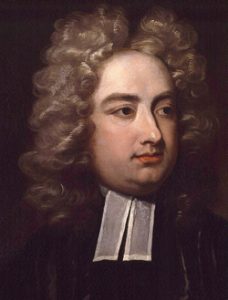
An Epigram
The scriptures affirm (as I heard in my youth,
For indeed I ne’er read them, to speak for once truth)
That death is the wages of sin, but the just
Shall die not, although they be laid in the dust.
They say so; so be it, I care not a straw,
Although I be dead both in gospel and law;
In verse I shall live, and be read in each climate;
What more can be said of prime sergeant or primate?
While Carter and Prendergast both may be rotten,
And damn’d to the bargain, and yet be forgotten.
Jonathan Swift
(1667 – 1745)
An Epigram
fleursdumal.nl magazine
More in: Archive S-T, Archive S-T, Swift, Jonathan
Franz Kafka (1883-1924) groeide op in Praag, waar hij deel uitmaakte van de Duitstalige Joodse gemeenschap en aan de rand van het getto woonde.
Hij bezocht het Duitse gymnasium en studeerde aan de universiteit van Praag. Daar ontmoette hij Max Brod, zijn vriend en latere biograaf.
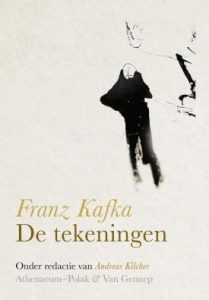 Vanaf 1908 tot 1917 werkte hij als ambtenaar bij een bedrijf dat arbeidsongevallenverzekeringen verzorgde, een baan die hij als een noodzakelijk kwaad beschouwde om zich aan het schrijven te kunnen wijden. Zijn longtuberculose, die hem in 1924 fataal zou worden, deed zich in deze tijd gelden. Gedurende zijn leven had hij enkele korte maar intense relaties, waaronder drie verlovingen, zo blijkt uit enkele postuum uitgegeven brieven. De dames waar hij mee omging komen ook indirect terug in zijn werk. Hij leidde een teruggetrokken leven, maar discussieerde veel binnen de Praagse culturele elite, mede via zijn ‘ontdekker’ Brod.
Vanaf 1908 tot 1917 werkte hij als ambtenaar bij een bedrijf dat arbeidsongevallenverzekeringen verzorgde, een baan die hij als een noodzakelijk kwaad beschouwde om zich aan het schrijven te kunnen wijden. Zijn longtuberculose, die hem in 1924 fataal zou worden, deed zich in deze tijd gelden. Gedurende zijn leven had hij enkele korte maar intense relaties, waaronder drie verlovingen, zo blijkt uit enkele postuum uitgegeven brieven. De dames waar hij mee omging komen ook indirect terug in zijn werk. Hij leidde een teruggetrokken leven, maar discussieerde veel binnen de Praagse culturele elite, mede via zijn ‘ontdekker’ Brod.
Een reconstructie van Kafka’s leven en denken is mogelijk geworden door zijn nalatenschap in de vorm van dagboeken, die hij van 1910 tot 1923 bijhield. Kafka schreef voornamelijk proza, waarvan zijn romans Der Prozess (1925), Das Schloss (1926) en Amerika (1927) de bekendste zijn. Enkele prozavertellingen als Die Verwandlung (1915), Das Urteil (1913) en In der Strafkolonie (1919) hebben later ook hun weg naar het grote publiek gevonden.
Wat Kafka’s werk typeert zijn tegenstellingen als weten en onwetendheid, macht en machteloosheid, loyaliteit en verraad, menselijkheid en verontmenselijking. Hij schetst labyrinten waarin individuen wanhopig naar een uitweg zoeken. De werelden die hij creëert zijn absurd, kennen een heel eigen logica en worden in een droge, zakelijke stijl beschreven. Veel van zijn werk is tijdens zijn leven onvoltooid gebleven, waardoor veel discussie mogelijk is over de bedoelingen van de schrijver. Pas in de jaren dertig van de twintigste eeuw groeide de belangstelling voor zijn werk, dat mede dankzij Max Brod postuum verscheen.
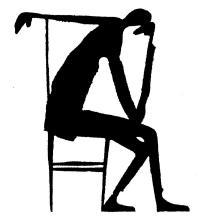 In 2019 werd het Max Brod Archief in de Nationale Bibliotheek van Israël geopend. Tussen de opvallende archiefstukken bevonden zich tot dusver onbekende tekeningen die Franz Kafka maakte in de jaren 1901-1906. Hij tekende, al voor de ontwikkeling van zijn literaire talent, om zich artistiek uit te drukken.
In 2019 werd het Max Brod Archief in de Nationale Bibliotheek van Israël geopend. Tussen de opvallende archiefstukken bevonden zich tot dusver onbekende tekeningen die Franz Kafka maakte in de jaren 1901-1906. Hij tekende, al voor de ontwikkeling van zijn literaire talent, om zich artistiek uit te drukken.
Aan zijn verloofde Felice Bauer schreef hij in 1913: ‘Weet je, ik was ooit een groot tekenaar, maar toen ben ik bij een slechte schilderes schoolse tekenlessen gaan nemen en heb ik mijn hele talent verknoeid. Stel je dat eens voor! […] In die tekeningen heb ik indertijd, het is nu al jaren geleden, meer bevrediging gevonden dan in enige andere bezigheid.’
In Franz Kafka. De tekeningen worden voor het eerst meer dan 200 tekeningen, waarvan 140 nooit eerder zijn gepubliceerd, in een luxe kunstuitgave samengebracht. Deze is samengesteld en van begeleidende essays en een verantwoording voorzien door Andreas Kilcher, Pavel Schmidt en Judith Butler.
Franz Kafka. De tekeningen
Auteur: Franz Kafka
Taal: Nederlands
Vertaald door Willem van Toorn
Uitgever Athenaeum
Hardcover
EAN 9789025313609
1 oktober 2021
336 pagina’s
Illustraties
49,90
# new books
Franz Kafka.
De tekeningen
• fleursdumal.nl magazine
More in: - Book News, - Bookstores, Archive K-L, Archive K-L, Art & Literature News, Franz Kafka, Illustrators, Illustration, Kafka, Franz, Kafka, Franz
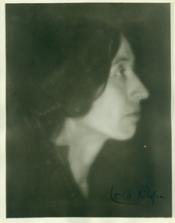
The Fog
Out of the lamp-bestarred and clouded dusk –
Snaring, illuding, concealing,
Magically conjuring –
Turning to fairy-coaches
Beetle-backed limousines
Scampering under the great Arch –
Making a decoy of blue overalls
And mystery of a scarlet shawl –
Indolently –
Knowing no impediment of its sure advance –
Descends the fog.
Lola Ridge
(1873-1941)
The Fog
• fleursdumal.nl magazine
More in: Archive Q-R, Archive Q-R, Ridge, Lola
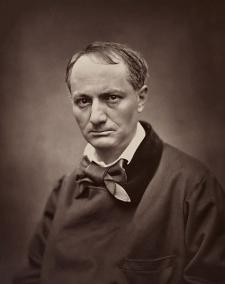
La Béatrice
Dans des terrains cendreux, calcinés, sans verdure,
Comme je me plaignais un jour à la nature,
Et que de ma pensée, en vaguant au hasard,
J’aiguisais lentement sur mon coeur le poignard,
Je vis en plein midi descendre sur ma tête
Un nuage funèbre et gros d’une tempête,
Qui portait un troupeau de démons vicieux,
Semblables à des nains cruels et curieux.
À me considérer froidement ils se mirent,
Et, comme des passants sur un fou qu’ils admirent,
Je les entendis rire et chuchoter entre eux,
En échangeant maint signe et maint clignement d’yeux:
— «Contemplons à loisir cette caricature
Et cette ombre d’Hamlet imitant sa posture,
Le regard indécis et les cheveux au vent.
N’est-ce pas grand’pitié de voir ce bon vivant,
Ce gueux, cet histrion en vacances, ce drôle,
Parce qu’il sait jouer artistement son rôle,
Vouloir intéresser au chant de ses douleurs
Les aigles, les grillons, les ruisseaux et les fleurs,
Et même à nous, auteurs de ces vieilles rubriques,
Réciter en hurlant ses tirades publiques?»
J’aurais pu (mon orgueil aussi haut que les monts
Domine la nuée et le cri des démons)
Détourner simplement ma tête souveraine,
Si je n’eusse pas vu parmi leur troupe obscène,
Crime qui n’a pas fait chanceler le soleil!
La reine de mon coeur au regard nonpareil
Qui riait avec eux de ma sombre détresse
Et leur versait parfois quelque sale caresse.
Charles Baudelaire
(1821 – 1867)
La Béatrice
Fleurs du mal (Flowers of Evil)
• fleursdumal.nl magazine
More in: Archive A-B, Archive A-B, Baudelaire, Les Fleurs du Mal
Thank you for reading Fleurs du Mal - magazine for art & literature